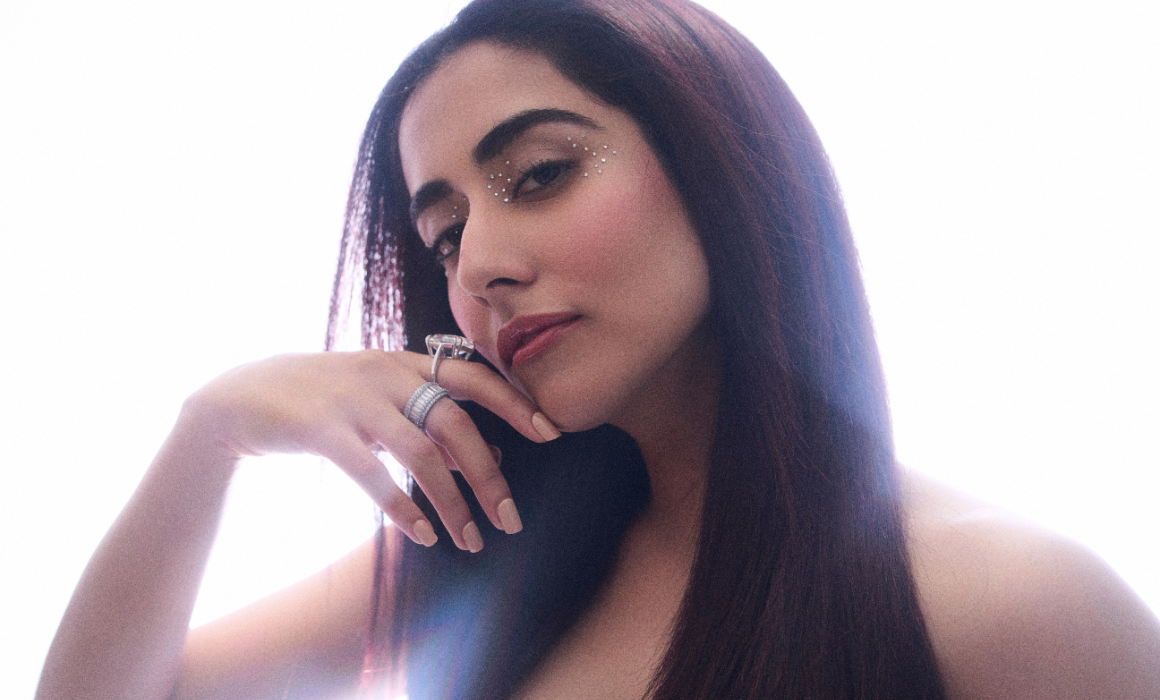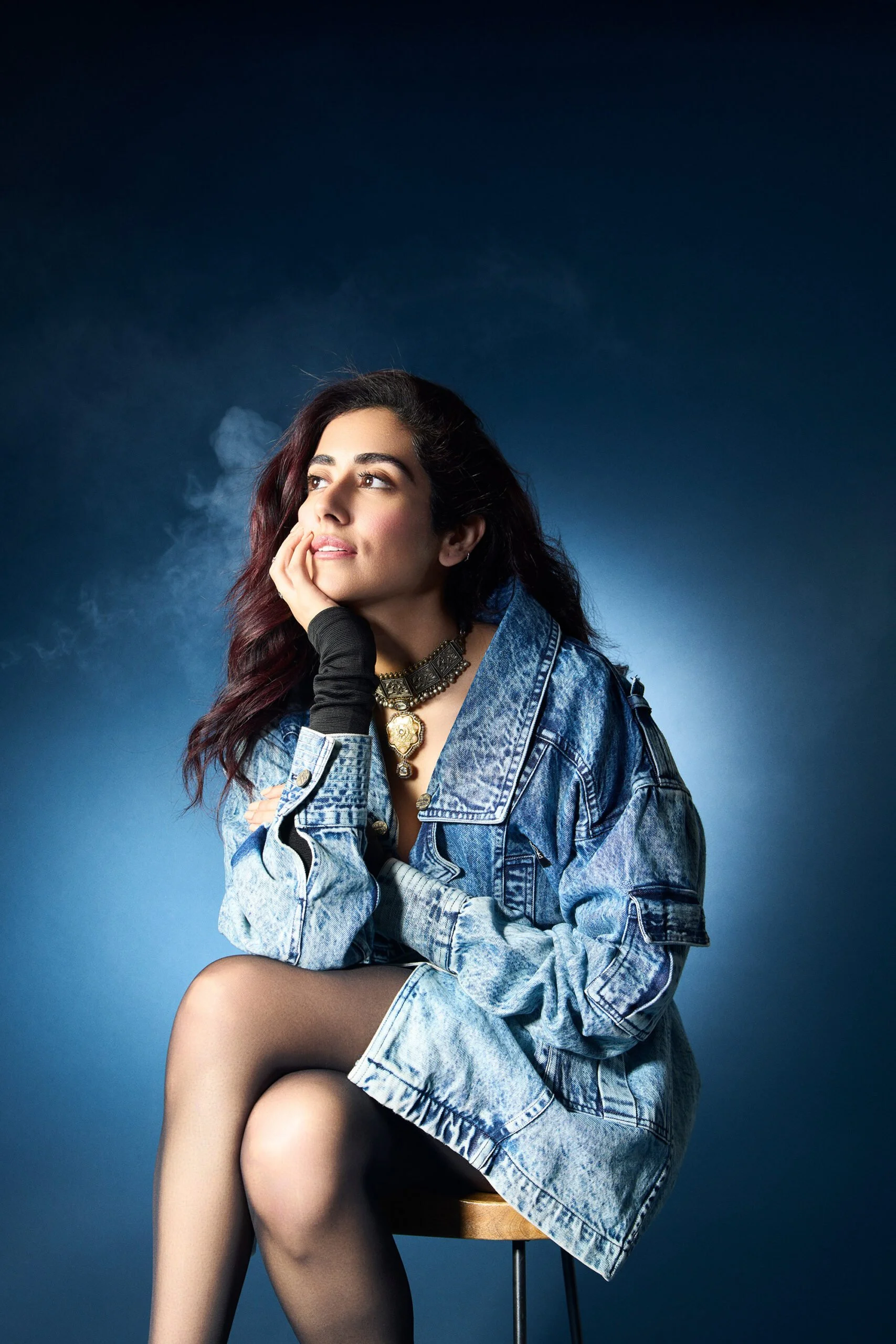From Brampton to Bollywood: How Jonita Gandhi Is Building a Global Pop Identity
After years of success as a playback singer in India, Jonita Gandhi is now busy finding her own voice.
Photo: Warner Music Group.
When Jonita Gandhi stepped on stage in Chennai with Ed Sheeran earlier this year, it was just one stop in a whirlwind schedule that saw her go from performing in Malaysia with Anitta to Delhi with Arijit Singh—all in the span of a few days. That dizzying timeline is par for the course for Gandhi, whose voice has captivated audiences across continents, languages, and genres. She even opened for Dua Lipa a year before. But long before she became one of India’s most exciting multilingual pop voices, she was just a girl in Brampton, singing Bollywood songs in her basement, and is now one of many South Asian talents making Canada the place to go for a refined brown sound.
Born in Delhi and raised in Ontario, the 35-year-old straddled two worlds from an early age—something that’s helped shape her signature sound: emotional pop grounded in the familiar textures of Indian music.
“Even though I didn’t live in India long enough to be deeply influenced by it, my upbringing in the GTA was filled with Indian culture, so it wasn’t hard to stay close to my roots,” she says. Her father, a keyboard player who gigged on the side, often filled the family’s home with Bollywood classics. “I was always surrounded by Indian music, and then I’d go to school and be exposed to every other culture. That variety really informed me.”
Still, Gandhi didn’t initially imagine a career in music. “My parents, like many South Asian parents, were very education-first,” she laughs. “They wanted me to finish my degrees before running off to be a singer.” And she did: two undergrad degrees, including one from Western University’s Ivey School of Business.
Photo: Warner Music Group.
“They really supported me doing music on the side so that I would have a solid foundation and could then have the liberty and flexibility to take a year off and explore music,” Gandhi added. “Then, if it didn’t work, I’d have a fallback plan, which helped make me less desperate.”
Fortunately, it more than worked out. In that year after graduation, she found herself back in India and, unexpectedly, in the heart of Bollywood.
Over time, her YouTube covers—filmed in her basement and uploaded in the early days of the platform—had quietly gained traction, building a growing, global fanbase. Composers, singers, even actors in Bollywood noticed. That’s what gave her the confidence to head back to India. Then, through an Ivey friend, Gandhi was introduced to engineer Abhishek Ghatak, who worked with renowned Indian duo Vishal–Shekhar. A visit to their studio turned into an impromptu audition, and then, her first official playback track, for Chennai Express. “They said it was just a scratch track,” she recalls, “but they ended up keeping my voice. It’s crazy.”
What followed has been an endless series of high-profile collaborations, including with legends like A.R. Rahman. She’s probably sung in more than a few of your favourite and recent Bollywood hits, including Rocky Aur Rani Kii Prem Kahaani (on which she sings the iconic “What Jhumka?”), Brahmastra Part One: Shiva and Highway.
Despite her success in playback singing, Gandhi is now carving out space for herself as an independent artist. She says, “I’ve worked really hard to establish myself as a playback singer, and I’ve brought in a lot of ears and eyes because of that. I don’t want to alienate any of those people. But there’s definitely a heavier focus right now on my music, because I feel like the people who [discover] me through playback will stay and hear my music and like it.”
Her recent EP Love Like That (which features a similarly titled single that was co-written with Latin Grammy-nominated producer Juan Ariza and beloved Pakistani American singer Ali Sethi) and single “Channa” do indeed mark a shift toward a more personal sound. She explains, “Most of my songs are emotional bangers. Pop, but with a rooted, ethnic soul.”
Language, for Gandhi, is both a tool and a bridge. She’s sung in more Indian languages than she can count (i.e. Hindi, Bengali, Tamil, Punjabi, Sanskrit, Urdu, Kannada, Gujarati, to name a few), sometimes phonetically without even knowing the meaning of the words. “It’s a playback thing,” she says, and a fun challenge. “It’s beautiful. All of a sudden, you’re connecting with people who you wouldn’t be able to sit and have a conversation with, but now they’re connected to you through the music. That’s really magical, and I never want to take that for granted.”
Now based in Mumbai, Gandhi is busy building a live act that includes elaborate choreography, another one of her lifelong passions. You can get a sneak peek at her moves in her latest music video, “Beparwai,” which dropped in June. “I’ve realized I’m a much happier performer when I’m dancing,” she says. “That’s something that I need to keep doing for me, not for anyone else or for how it might add to the act.”
Her ultimate goal? “I want to be the kind of act that represents India on a global stage. I want to do Coachella someday.”
With her cross-cultural fluency, uber popularity (the singer currently boasts nearly 3 million Instagram followers) and drive to innovate, there’s little doubt she’s getting closer to that stage.


